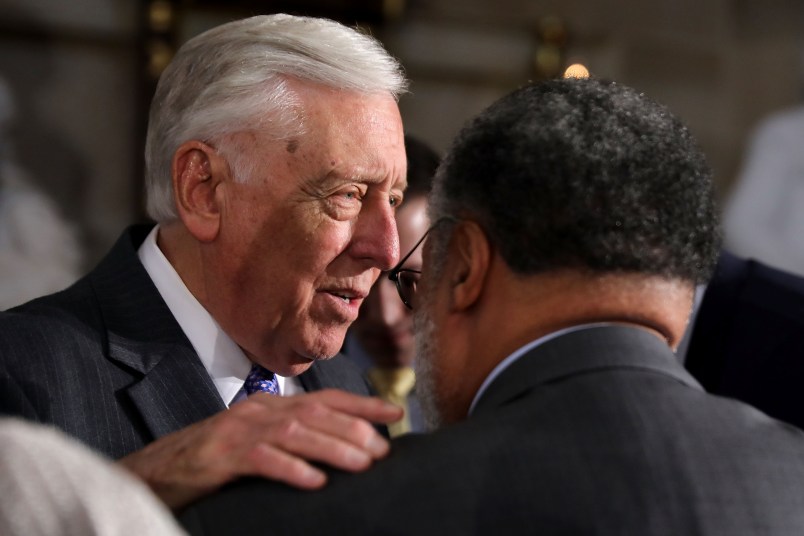At an invitation-only roundtable with Capitol Hill reporters Friday morning, Rep. Steny Hoyer, the number two House Democrat, gave a full-throated defense of Democrats’ strategy of putting a thumb on the scale in primaries across the country. Hoyer was responding to criticism sparked earlier this week when The Intercept published a recording in which he urged a progressive candidate in Colorado to drop out of his race.
“What is really important from our perspective is making sure that we have a Democrat that can win in districts that are tough, so we work towards that end,” he said. “It would be foolish, in terms of trying to have a working majority so that we can change policies, to not try to put ourselves in the strongest position we could be in.”
Hoyer, who told reporters Friday that he is extremely confident that Democrats can take back control of the House of Representatives in this November’s midterm elections, has faced complaints from the progressive wing of the party for steering funding and institutional support toward more moderate candidates in competitive districts across the country.
There was somewhat of a backlash to this strategy in Texas, where the Democratic Congressional Campaign Committee (DCCC) released opposition research about a progressive candidate in an attempt to boost her more moderate opponent, who they feel has the best shot of flipping a district in Houston’s suburbs. The progressive candidate, Laura Moser, made the May runoff anyway, and even got a fundraising boost after she sounded the alarm about the DCCC trying to push her out of the race.
The Progressive Change Campaign Committee, angered by the leaked audio of Hoyer urging Levi Tillemann to drop his bid to unseat Rep. Mike Coffman in Colorado, is fundraising for Tillemann, and has joined Democracy for America and other liberal groups in calling for Hoyer’s ouster from party leadership.
More broadly, some critics of the strategy argue that the party’s assessments of which candidate is more electable are often flawed, and that intervening can do more harm than good by alienating progressive voters and activists whose enthusiasm is crucial to Democratic chances this fall.
Still, Hoyer said he and his fellow Democrats have faith in the strategy.
“Leadership requires making recommendations that you think will be the most effective. I don’t think we’re dissuaded from that,” he said, characterizing the backlash from the un-favored progressive candidates as sour grapes. “I understand that if you’re the person we do not think is the strongest candidate, you’d say, ‘You need to keep your nose out of here!’ But every person who we feel is the strongest says, ‘Yeah, c’mon in!'” he said with a laugh. “It’s normal. We’re human beings.”
As anti-Trump sentiment and favorable political winds have motivated a wave of Democrats to run for office, making plays in districts the party has long written off as solidly red, national party leaders are worried that several key primaries will be so crowded that Democrats will blow the opportunity to pick up the seat.
The problem is particularly acute, Hoyer said, in California, where so-called “jungle primaries” allow the top two vote-getters from any party to advance to the general election.
“I don’t like the system,” he said. “I don’t think it provides for what I think Americans deserve, which is a debate between two perspectives of where they want the government to go. If you have two Democrats or two Republicans, you don’t really get that. It’s not fair to the voters.”
In particular, the party is anxious that the four Democrats running to unseat Rep. Ed Royce (R-CA) could split the vote and all fail to move on to the general election.
“We’re worried about that, and we’re trying to talk to people and make sure that at least one viable Democrat advances,” Hoyer said.
Both in that race and in Colorado, the focus of Hoyer’s leaked conversation, the Democratic whip emphasized that the party’s favoritism was practical, not personal.
“It’s not a concern about a particular Democrat, it’s about having a Democrat in the final two who we really think is viable,” he said. “We disagree strongly with the policies being pursued by Trump and the Republicans and our argument is that we need to make sure we change those policies.”







“More broadly, some critics of the strategy argue that the party’s assessments of which candidate is more electable are often flawed, and that intervening can do more harm than good by alienating progressive voters and activists whose enthusiasm is crucial to Democratic chances this fall.”
That is my concern in a nutshell. I am not confident that the aging Democratic leadership have the best sensitivity in those fingers they are holding up to check the wind direction.
Hoyer is right. We do need Democrats that can win. Except the Democrats he’s been choosing haven’t been winning.
This old democrat wants younger leadership.
Democracies, to survive, need choice; no matter the party candidates should not run unopposed.
The Republican Party establishment, the Democratic party establishment… birds of a feather.
But the success of the insurgent Trumper wing of the Republican party should give hope to those who want to see a real change. Once the “Outs” become the “Ins”, the old “Ins” want to get real friendly with the new bosses. Real friendly.
All it takes are a few wins by “non-endorsed” candidates, and watch how the rhetoric changes. And how fast.